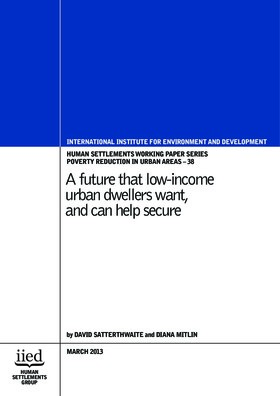A future that low-income urban dwellers want, and can help secure

Urban development decision-makers rarely bring the urban poor themselves into their legislative, policy and programming processes and our starting point in this report is that cooperation between government and people is too infrequent. This policy report identifies and elaborates on the role of organised communities, networked at city level, to urban poverty reduction in the Global South. It highlights the potential contribution of local involvement of grassroots groups in urban development - despite the lack of recognition and support from donor agencies and national governments for this type of community driven initiative. Locally driven initiatives have already made a substantive contribution to poverty reduction. ~Context matters and it is clear that simple replication does not provide complete or even necessarily workable solutions. Nevertheless there are a few over-arching principles that emerge consistently from the studies reported here; one is that local government needs to involve and communicate with local communities to meet their needs and address issues together. This process of cooperation can be facilitated by a demonstration of competence and willingness to participate by local groups. Local groups have been effective in bringing forward their own social initiatives from a grass roots level and demonstrating how such initiatives can be replicated by local government. Avoiding both contestation with the state and political party affiliations while demonstrating development solutions has enabled local communities to advance their needs and interests while protecting their autonomy. ~As questions about what should follow the Millennium Development Goals (MDGs) are considered, it is important to address a gap in their first formulation and place greater emphasis on the implementing agencies. The discussion at the end of the report explores both how post-MDGs targets may be achieved through more effective local action and considers the more ambitious target of universal access to basic services.
Cite this publication
Available at https://www.iied.org/10626iied